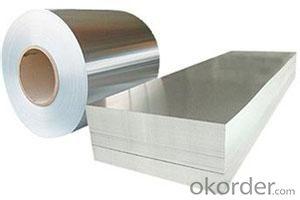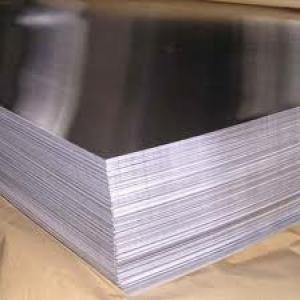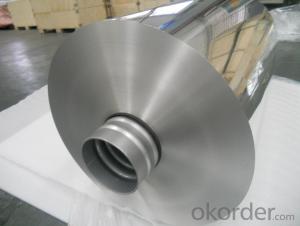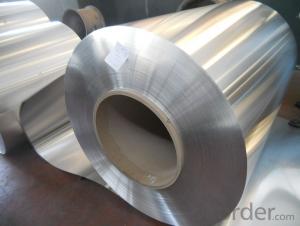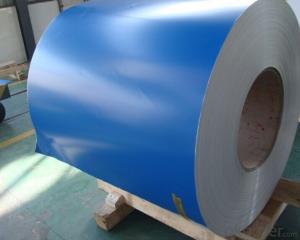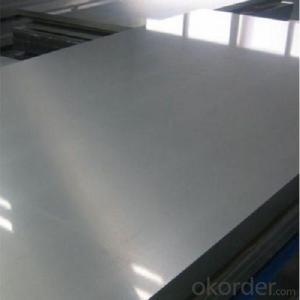Wholesale alumunum mill finish panel in China
- Loading Port:
- China main port
- Payment Terms:
- TT or LC
- Min Order Qty:
- 1 m.t.
- Supply Capability:
- 3 m.t./month
OKorder Service Pledge
OKorder Financial Service
You Might Also Like
Aluminium is a relatively soft,durable, lightweight, ductile and malleablemetal with appearance ranging from silvery to dull gray,depending on the surface roughness. It is nonmagnetic and does not easilyignite. A fresh film of aluminium serves as a good reflector (approximately92%) of visible light and an excellent reflector (as much as98%) of medium and far infrared radiation. The yield strength of pure aluminium is 7–11 MPa,while aluminium alloys have yield strengths ranging from200 MPa to 600 MPa. Aluminium has about one-third the density and stiffnessof steel. It iseasily machined,cast, drawn and extruded.
Alu Plate
Alloy: AA1050, 1060, 1100, AA3003, 3005, 3015, 5052, 5754, 5083,8011,etc
Temper:H14/16/18/22/24/32,HO etc.
Thickness:0.2mm—100mm
Width:100mm—2300mm (Can be slitted)
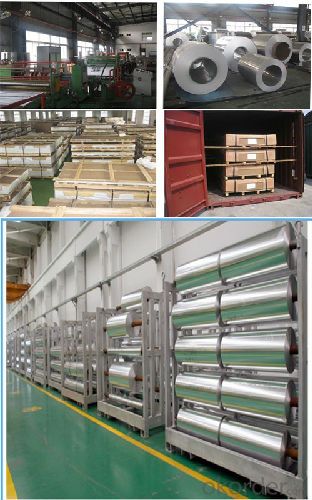
Application: Foil stock, Circles, Roofing, Canstock, Marine plate,Anti-sliperypurpose in vehicles, packing and appliance.
According to the order of the thermal conductivity of the metal, corrosion resistance and production cost, refrigerator interior sheet metal is chosen instead of aluminum other metals, to ensure its good thermal conductivity of the premise, as far as possible to reduce costs and the choice of corrosion-resistant material processing, aluminum is the best choice.
Secondly, in order to increase the length of the liner internal exchange area and the outside air heat, refrigerator interior selected embossing plate instead of the flat plate. In the absence of refrigerator interior space cause pressure to increase the use of embossed aluminum air tank wall contact area for a more efficient uniform heat exchange.
Speaking on the cooling rate: according to the laws of physics, thermal conductivity of aluminum is 237W / mK, the thermal conductivity of iron is 80W / mK, the thermal conductivity of the larger the number, the better the thermal conductivity, under the same conditions cooling faster the cooling effect is better. Using embossed aluminum evaporator, cooling rate is 3 times the wire tube evaporator. You can do a little to test in the refrigerator freezer compartment through an aluminum plate on a drop of water drops, 5 seconds into the ice, cooling is very fast!
- Q:How do I prevent corrosion on aluminum sheets?
- To prevent corrosion on aluminum sheets, several steps can be taken: 1. Regularly clean the aluminum sheets using a mild detergent or aluminum cleaner to eliminate any dirt, grime, or chemical residues present on the surface. This will prevent the accumulation of corrosive substances. 2. It is worth considering the application of a protective coating on the aluminum sheets. There are different types of coatings available, such as clear coats, anodizing, or painting. These coatings act as a barrier between the aluminum and the surrounding environment, effectively preventing corrosion. 3. Take care to avoid contact with corrosive substances. Aluminum can be susceptible to corrosion when exposed to certain chemicals like acids, alkalis, or saltwater. Be mindful of the environment in which the aluminum sheets are stored or utilized and steer clear of exposure to these corrosive substances. 4. Store the aluminum sheets in a dry environment with low humidity levels. Moisture can accelerate the corrosion process, so it is crucial to keep the sheets dry and protected from excessive moisture. 5. Consider implementing preventive measures such as using corrosion inhibitors or anti-corrosion sprays specifically designed for aluminum. These products can provide an additional layer of protection against corrosion, particularly in harsh or corrosive environments. By adhering to these preventive measures, the risk of corrosion on aluminum sheets can be significantly reduced, effectively extending their lifespan.
- Q:Can aluminum sheet be used for heat exchangers?
- Yes, aluminum sheet can be used for heat exchangers. Aluminum has excellent thermal conductivity and is lightweight, making it a suitable material for transferring heat efficiently in heat exchangers. Its corrosion resistance and durability also make it a popular choice in various heat exchange applications.
- Q:Can aluminum sheets be used for boat hulls?
- Yes, aluminum sheets can be used for boat hulls. Aluminum is a popular material for boat construction due to its lightweight, durability, and resistance to corrosion. It is commonly used in both commercial and recreational boats, providing strength and stability to the hull.
- Q:Can aluminum sheets be used for sound barriers?
- Yes, aluminum sheets can be used for sound barriers. Aluminum is a lightweight and durable material that can effectively reflect and absorb sound waves, making it suitable for creating sound barriers in various applications.
- Q:Can aluminum sheets be an alternative to glass in certain applications?
- Yes, aluminum sheets can be an alternative to glass in certain applications. Aluminum is lightweight, durable, and has excellent corrosion resistance, making it suitable for outdoor and industrial applications where glass may be prone to breakage or damage. Additionally, aluminum sheets can provide better insulation and soundproofing properties compared to glass. However, it is important to consider specific requirements and limitations of each application before choosing aluminum sheets as an alternative to glass.
- Q:Are the aluminum sheets suitable for manufacturing architectural column covers?
- Yes, aluminum sheets are suitable for manufacturing architectural column covers. Aluminum is a lightweight yet durable material that offers excellent corrosion resistance, making it ideal for exterior applications such as column covers. It can be easily shaped, bent, and fabricated to create custom designs and sizes, allowing for versatility in architectural projects. Additionally, aluminum sheets can be finished with various coatings, such as powder coating or anodizing, to enhance their aesthetic appeal and provide additional protection against weathering and wear. Overall, aluminum sheets provide a great combination of strength, versatility, and aesthetics, making them a suitable choice for manufacturing architectural column covers.
- Q:Can aluminum sheet be used for soundproofing?
- To a certain degree, aluminum sheet can indeed be utilized for soundproofing. Its dense and rigid composition makes it proficient in obstructing sound transmission. By combining it with other soundproofing materials like foam or mineral wool, its soundproofing capabilities can be further augmented. Nevertheless, it is crucial to acknowledge that aluminum sheet alone may not deliver absolute soundproofing since its thinness can still permit some sound to penetrate. Moreover, ensuring proper installation and sealing of all gaps and openings is imperative to maximize the soundproofing efficacy of aluminum sheet.
- Q:What are the common sizes of aluminum sheet?
- The sizes of aluminum sheets commonly differ based on specific requirements and industry applications. However, the market offers some standard sizes that are readily available. These sizes typically vary in thickness from 0.025 inches to 0.125 inches and are offered in different widths and lengths. Among the common width options are 36 inches, 48 inches, and 60 inches, while the length can range from 96 inches to 144 inches. Furthermore, smaller sizes like 12 inches by 24 inches or 24 inches by 24 inches can also be found, which are frequently utilized for smaller projects or crafts. It should be noted that specialized aluminum sheet suppliers can provide custom sizes as well.
- Q:What are the standard sizes of aluminum sheets?
- Aluminum sheet sizes can differ based on the manufacturer and specific needs. Nevertheless, there are several standard sizes commonly found for aluminum sheets. These include 4 feet by 8 feet (1.2 meters by 2.4 meters), 4 feet by 10 feet (1.2 meters by 3 meters), and 5 feet by 10 feet (1.5 meters by 3 meters). These sizes are widely utilized across various industries and are easily accessible in the market. Furthermore, specialized aluminum sheet suppliers can provide custom sizes tailored to meet specific project requirements.
- Q:What is the typical flammability rating of aluminum sheets?
- Class A flammability ratings are typically assigned to aluminum sheets. This rating indicates that they possess a strong resistance to fire and are unlikely to ignite or facilitate the spread of flames. Aluminum is classified as a non-combustible substance, which is why it is widely favored in industries like construction, transportation, and aerospace, where fire safety is a priority. Additionally, its elevated melting point and exceptional heat dissipation qualities further contribute to its ability to withstand fire.
1. Manufacturer Overview |
|
|---|---|
| Location | |
| Year Established | |
| Annual Output Value | |
| Main Markets | |
| Company Certifications | |
2. Manufacturer Certificates |
|
|---|---|
| a) Certification Name | |
| Range | |
| Reference | |
| Validity Period | |
3. Manufacturer Capability |
|
|---|---|
| a)Trade Capacity | |
| Nearest Port | |
| Export Percentage | |
| No.of Employees in Trade Department | |
| Language Spoken: | |
| b)Factory Information | |
| Factory Size: | |
| No. of Production Lines | |
| Contract Manufacturing | |
| Product Price Range | |
Send your message to us
Wholesale alumunum mill finish panel in China
- Loading Port:
- China main port
- Payment Terms:
- TT or LC
- Min Order Qty:
- 1 m.t.
- Supply Capability:
- 3 m.t./month
OKorder Service Pledge
OKorder Financial Service
Similar products
New products
Hot products
Hot Searches
Related keywords
